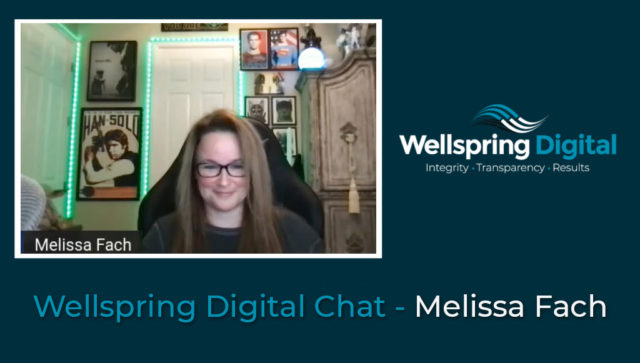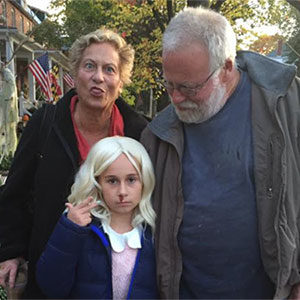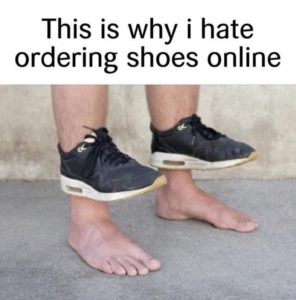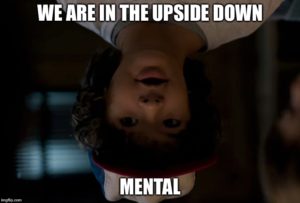I’ve been following Melissa since I’ve been in this digital marketing game. She has been a trusted SEO resource for me for many years and I think you will see why in our chat. No pressure, Melissa.
I am a car junkie; I love looking up older cars and dreaming of buying all of them. And much to my wife’s dismay, I watch car restoration shows like it’s my job. It’s a problem. Anyway, I get to talk cars and SEO with Melissa, more on the SEO side, of course.
And even though we focus through the lens of car marketing, there is good stuff for anyone looking to get a leg up in digital marketing today.
Specifically, we discussed…
- Today’s online car-buying habits
- How to keep a mammoth site like Kelley Blue Book visible and relevant
- The car market during the pandemic and post-pandemic
- Google’s auto-listing pilot programs and why Google can’t leave well enough alone
- The future of car buying
And, yeah, she has some good rants in there too. Worth watching for sure! Enjoy!
Digital Transcription (Edited for Readability)
Introductions
Jon-Mikel Bailey: Hey, folks, how you doing? Doing good. That’s great. My name is Jon Bailey. And this is the Wellspring Digital Chat series where through the dark arts of demonic possession, we go out and sort of psychically infiltrate the brains of some of the smartest marketers around. We pull out all the good stuff, we share it with you. There’s no real damage done. Maybe down the road, some psychological damage, but it’s, it’s minimal.
So I’ve been watching a lot of Stranger Things. And I think it’s starting to really affect my day-to-day thinking. So I apologize in advance for that.
Anyway. I’ve been following Melissa Fach for oh my god, years and years and years. I’ve been reading her stuff since I’ve been in this digital marketing game. She’s been a trusted SEO resource for me for many years, and I think you’ll see why in our chat. So you know, no pressure, of course, to deliver, but welcome, and please take a moment to introduce yourself to these fine folks.
Melissa Fach: Okay, I guess I’ve been in the SEO game since 2007 or 8. I started off blogging, like all of us did, and learning. Around 2010, you know, SEJ came to me and was like, “Hey!” So I worked with SEJ and I worked with Moz, Authority Labs, SEMRush, and PubCon. So I’ve always been in the SEO realm. So I mostly work with Kelley Blue Book and Autotrader, best move I’ve ever made. Very excited, should have done it a long time ago.
Jon-Mikel Bailey: Well, that’s awesome. It’s a twofer for me because I’m a total car junkie. I love looking up older cars on Autotrader, I actually have the app, just so I can go on there and look up all the cars that I will never buy but can dream of buying. And much to my wife’s dismay, I am completely addicted to car restoration shows. And I watch them constantly and it drives her insane.
She’ll come home from work and I’ll say “what do you want to watch?” And she says “anything but car shows.” And that’s pretty much in an every evening event, but it’s a problem anyway. I get to talk cars and SEO with Melissa. So more on the SEO side, of course.
Melissa Fach: I’m excited. I don’t think a lot of people know that. I’m a car dealer’s daughter.
Jon-Mikel Bailey: Oh, I didn’t know that.
Melissa Fach: I grew up and in our family, you started working at 11 over the summer. I’ve been in the car dealerships from a young age like it’s in your blood. The Honda, yellow and black Honda CRX, man I wanted that car.
Jon-Mikel Bailey: I know exactly what you’re talking about.
Melissa Fach: So my brother wanted to Prelude, so yeah, I’ve been around cars for a long time. I always loved cars. Not the classics like you so much.
Jon-Mikel Bailey: But no, I like the older Honda’s and Toyota’s too. I actually totally geek out over like, my first car was a Datsun 1982, Datsun 210 station wagon. It was a great little car.
Melissa Fach: As far as a Dodge Daytona, the rule was you work all summer, you raise your money, buy your own car. Just not given to you. Buy your used car and screw it up and eventually, we’ll get you a nice one we have. Cars in the blood so it was a perfect fit.
Jon-Mikel Bailey: So well that’s awesome. Well you know I’m really excited to jump into this and there have been some crazy changes in the whole car world that we’re certainly gonna get into here so are you ready?
Melissa Fach: I’m ready.
Jon-Mikel Bailey: Let’s do this.
Today’s Online Car-Buying Habits
Jon-Mikel Bailey: Alright, so I read in a recent GoFishDigital.com post that on average car buyers spend about 12 hours searching the internet when looking to purchase a vehicle, which seemed a little low to me actually, and maybe that’s because I’m addicted to Autotrader. But do you have any specific stats on this and I’m curious what you see in terms of car buyers and their online research habits these days?
Melissa Fach: Yeah, I mean, we have a whole data department. And they say about the same thing about 12 and a half hours, I think it’s different, depending on the buyer. New buyers kind of know what they want. The problem is because of the chip shortage, there are not as many vehicles available. So they’re having to, or the budget, you know, cars are selling for so much more than what they were.
So it’s like, “okay, I wanted this one, but I can’t afford it. I need this size.” And then they really want to know a lot, especially now about fuel efficiency. What are the features of the car? You know, the new vehicles are coming out, should they wait, should they not? Maybe I’ll just wait for this PHEV, I love that kind of thing. But for the used car buyer, it’s really complicated because the cars are selling for so much.
And you’re having to get more miles on a vehicle than you would have ever considered in the past. And then also, what are the features? So we see a lot of digging for, what is this feature in? Is it available in this trim? Like, or what is this trim mean? And then we have to break it down for him, okay, with this trim, you get XYZ or this is optional, so you can look for it. So, I think the buyers are far more educated than they were before. So we’re constantly trying to provide all the information for different kinds of buyers.
How to Keep a Mammoth Site like Kelley Blue Book Visible and Relevant
Jon-Mikel Bailey: I mean, I remember when the Kelley Blue Book was an actual book, which was many moons ago. But, now, it is amongst hundreds, if not 1000s of websites out there that are deep, deep resources for anyone looking to buy a car. So, can you give us a glimpse into what it might take to keep a site like Kelley Blue Book relevant and visible with all these other sites out there right now? And all this information?
Melissa Fach: I think we’re very blessed in that our SVP Mike Wulf believes in SEO and supports the SEO effort.
Jon-Mikel Bailey: That’s a huge benefit.
Melissa Fach: Yes, we don’t have to go in and battle about anything because he is there for us. And it’s like SEO needs this. So that’s huge. We also have our senior director Tessa Nadik. She has handpicked everybody on our team, we have a phenomenal team of experts in different areas. So that everything technical is covered. For both Kelley Blue Book and Autotrader’s new listings. We have informational pages, we have editorial content.
So, all of it, we have experts for everything. We have great engineering teams, we have data teams that fill us full of information, “okay, let’s go this way, let’s go that way.” Authority is key, as we know, in all things, which means having the best of everything and everyone so that we can create pages and content that are the best.
But then you have an SEO, like us that we’re constantly monitoring. And competitive research is massive in this field, because as you know, in the automotive industry, there are tons of competitors, monitoring consumer interests and how that changes. Also, something the SEO team pays attention to all the time. So you know, when people say, “Well, you want to meet the intent of the consumer.” That sounds easy. But yeah, consumers are different.
You know, we created a Best Cars for Tall People. That has been so crazy successful. Because yeah, because men with long legs, they’re gonna have you know, Brian McDowell, he’s like six, five, Lauren Baker, six, five. They can fit in my vehicle, that is a huge factor. So you have to meet different intents.
And then you have the tech-savvy, and then you have them so it’s a constant. We don’t have personas, but we’re constantly engineering and planning for that. There’s just a lot to it. You have a large team and a large engineering team and a large editorial team. Luckily, we’re all supported by the company.
Google E-A-T, YMYL, and Car Content
Jon-Mikel Bailey: Is something like Google E-A-T, something that factors into, you know, what you guys are doing from an editorial standpoint, or even from a technical SEO standpoint? Or do you think that that’s just kind of restating the obvious that “yes, we’ve always known this Google, thank you, but we’ve always known that Google E-A-T is hugely important?”
Melissa Fach: It’s huge, E-A-T and YMYL are constantly, okay, because a financial decision about buying a car is a big one. If you’re gonna spend 40 grand of your money and be paying out over five years, like, a good example of this is the BMW X5 PHEV. Okay, great vehicle, does not have a spare tire. Okay, some sites are reporting a spare tire.
No, because of the batteries, there is no spare tire, you have run-flats. Some people don’t know what a run-flat is. So, yes, it’s the little things that are educating the consumer to the little nitty-gritty point. And here I am, an SEO and I know the little fine details of the car. Because I’m the one checking, right.
But we have a full team of fact-checkers and editorial people that are fantastic and know everything about cars. And I learned from them, but I see it on other sites. I see mistakes all the time. Does Google know to that level, I don’t know? But we’re not going to be responsible for promising something in a vehicle that isn’t there at their investment.
Jon-Mikel Bailey: I think that’s the like, does Google know to that level? You know, it’s like everybody’s like, we think, maybe, not sure. But let’s err on the side of caution and make sure that we dot our i’s and cross our T’s.
The Car Market During the Pandemic and Post-Pandemic
Jon-Mikel Bailey: The pandemic especially was a total boon for car dealers. I mean, first of all, why do you think that is? And what can they do to keep that up as we move into, I don’t even know if we can call it a post-pandemic reality, but the dust settled period?
Melissa Fach: It was a unique time. And there are two things that happened because we actually bought a vehicle, in April of the year of the lockdown. Okay. What happened is, everybody, panicked, people had no money, they were money hoarding, panicking, the car dealers panicked, and they wanted to sell cars quickly. We bought a truck that would cost $17,000 more before the lockdown. Right? They were just dumping vehicles to get them off the lot, right?
And then, so that was kind of great. But then what happened is everybody started moving. They were in the big cities, people that never needed a car, they lived in a small apartment, and they were going to be locked in 1200 square feet with two kids and two dogs. And so for example, stats are that 3 million people moved to Florida during the pandemic. I can tell you that there is no walking to the grocery store here. You drive for everything.
So you had a lot of people who were like, well, I need a car. And even in the cities, a lot of people were saying I don’t want to ride in an Uber, I don’t know if they have COVID. So people were buying cheap vehicles to get around themselves. So there was a lot of factors that created all of that, which has come to a screeching halt because of the chip shortage.
Because vehicles, I believe it was like 2.1 million less vehicles were made in the past 12 months, because of the chip shortage, right? Yeah. Um, and everyone’s talking about new electric cars, electric cars, yeah, but not all of them are coming out. And if they do, you’re gonna spend a premium right now to get it.
A lot of people are, you know, what, I just bought a really expensive home to move. Interest rates are high, we’re going to freeze spending for a little bit. I think we’re going to have that for the next 12 to 18, maybe 24 months, depending on what they say the chip shortage is lessening. But even so the manufacturers I read on Auto News yesterday, they’re cutting back lines of their cars, because even with the chip shortage reduction, you’re still not enough to make cars like they used to.
There’s going to be a difference for a while.
Digital Marketing Strategy Is The Answer?
Jon-Mikel Bailey: I mean, and it’s not just cars, you know, you see it across a ton of industries where, you know, it was it was boom or bust. You know, they were either crushing it during the pandemic and now they’re like, what do we do now?
So, I mean, and I’m not here to say that digital marketing is the answer. But I think and maybe I’d love to hear your opinion on this. I think that, if you have a strong digital marketing strategy, it gives you a leg up and I think it allows you not to be able to tell the future but to prepare for multiple scenarios, multiple outcomes, right?
Melissa Fach: If you can’t find a way to pivot, you’re gonna have a problem. I’m not necessarily going to say what we’re doing to pivot, but we’re pivoting to maintain customer interaction. So when the time is there, they’re going to get the car, they’re ready to come back to our sites. But we are, that’s for a minute, I told my boss, I’m like, How do I pivot now with no cars and talk, I mean, I can talk about cars, but the cars aren’t available.
And so we have found strategies. And it took a lot of me just reading, staring, studying trends predicting to pivot, right? Because the bottom line is the company has to make money. And, you know, so that would be the big thing. If can’t pivot, then you’re in trouble with digital marketing.
Google’s Auto-Listing Pilot Programs and Why Google Can’t Leave Well Enough Alone
Jon-Mikel Bailey: Yeah, absolutely. And, you know, the rules are always changing. I mean, Google recently rolled out a pilot program where car dealers can show their listings directly on their Google Business Profile, which used to be called Google My Business, because Google likes to change the names of things constantly. But that’s a whole another topic area.
But I’d love to hear your thoughts on this pilot program. And, you know, if you think it’s a good thing, and do you think it will last and possibly expand into other markets?
Melissa Fach: Can I rant? Oh, please?
Jon-Mikel Bailey: Yes, this is a rant, rant-friendly zone. Okay, rant on…
Melissa Fach: Not necessarily even about this particular topic. But Google as a whole, and what they’re doing with car dealers, is infuriating to me. Okay. So beyond that, we have the, let’s just say you do a basic year, make, model search. You’re gonna have ads all the way across the top that the dealer’s gonna have to pay for, you’re gonna have the map with maybe three listings.
Now in the past, if you search for a car, they were going to show you dealers in your area. That’s how it worked. We all knew local search was huge. They have removed that with car dealers. So now there are three people who may be on the map, but you got to pay to have that top spot. Then you got people also ask, and when you go to organic, you get a bunch of dealers who are not anywhere near you. Right?
Like I’m not buying in Alaska or Hawaii. After the July core update, I actually tweeted at Danny Sullivan. And I was like, why are you giving me sites for India and the UK? I’m not buying a car from there and having it shipped to Florida. Now I know they’re paying attention because that disappeared. But what has not changed?
And I have yelled it all over Twitter for almost a year. Now. Why do I keep seeing dealers from other states in organic? So I’m not saying, I’m not like a tinfoil hat type of person. But either Google’s AI, what they’re using, or their algorithm is broken, which I know. They fix the international thing. They’re just not fixing this. So are they going to force dealers to advertise to show up in their local area?
Are they trying to force the users to relearn how to use the search engine? So did you only use the paid where they’re going to make money? I don’t like this. This goes against everything Google says. And what’s also irritating is they have dealers, and I know you’ve seen this, some companies just put the same content on every dealer website. Right? Like they’ll create articles on their blog and they’re the same on 900 car dealerships, right? Yeah. And Google is ranking them in a row for the same content. And it’s like, give them a totally…
Jon-Mikel Bailey: That goes against everything that Google says that they do and want you to do.
Melissa Fach: Like I told Lily Ray, I think it was literally, or Marie Haynes, I was like the whole E-A-T/YMYL thing is obviously a lie. Because the car dealers locally who are like, you know, XYZ for this area kind of content, they’re not showing up at all they have to pay to show up. So I don’t think this is Google My Business, Google Business Profile, whatever, I don’t this is a profile.
Yeah, it’s not going to help people. Unless the user learns how to click on the map. Go to the dealer. So what they’re looking for, then, what did we learn from the very beginning? Users are not going to overwork to find what they want? Sure, Google is basically forcing you to do that or just click on our head.
So to me, it’s crappy and it’s really crappy to do it to car dealers at a time like this where they have lost substantial money because they have no cars, like a couple of dealerships here have cut staff 70% are gone. That’s how bad and then now on top of that, you’re gonna make them pay. Yeah, I think it’s crappy but from…
Jon-Mikel Bailey: The product they don’t have.
Melissa Fach: Exactly right. So when they finally do get a car and they might actually make a little money that will keep somebody employed, you’re gonna make them pay. I’m frustrated, because everything I’ve taught everybody over the years seems to be disregarded. Is there a local search anymore? Not for car dealers? There’s not. So that’s not right. That’s my rant.
Jon-Mikel Bailey: No, and I appreciate that. Because I think it you know, it really speaks to this, this whole sort of split personality that Google seems to have where they’re telling you one thing and all their documentation and all of their advice and whatnot. And then the results are completely something different. And so it’s like, okay, well, is Google lying? Or are they? What’s going on here?
Melissa Fach: How much more money do they need to make as well?
Jon-Mikel Bailey: Well, yeah, there’s that too.
Melissa Fach: It’s not like you lost money in the pandemic. And you’re just screwing over another huge industry? Yep. And the individual dealers. And when you asked John, you know, Gary, and Danny, and they are radio silent, that tells you something. They just will not respond to the question. So I thought that I want to hurt my friendship with anybody. I’m just saying you guys won’t respond. And yes, I’m mad.
Jon-Mikel Bailey: It’s a problem. It’s a huge problem. And it’s, and it’s, and it’s one of those things that like, well, it’s not us, so we’re not going to worry about it. Well, but it’s gonna be because if they make that, and that’s kind of where I was going with my question is, you know, if this is seen as a success by Google, who’s next?
Melissa Fach: Right? If it’s you remember the whole YMYL thing, right? We want our users to get good information and make a good buying choice. There’s no good information for them because they won’t even allow an honest review to show up. Okay, there are no more reviews, you have to actually search for reviews and other keywords to get a review to come up.
So there’s no information for them to learn about the vehicle. So how are they going to know you’re basically forcing them to just keep digging, digging, digging, digging, which we used to have to do in the old days, and they made it easier for us? Oh, it’s local. There you go. There’s my car dealership right there. That’s, I’ll go to that one. So it’s little things like that, that go against everything they’ve told us for years.
The Future of Car Buying and The Future of Search
Jon-Mikel Bailey: So that kind of is a perfect segue. And the last thing I want to talk about here, which is you know, we’re now seeing people purchasing cars completely differently, which we’ve talked about. They’re buying cars without ever setting a foot in a showroom. I mean, what do you see as the future of car buying? Are y’all gonna, you know, test drive cars in the metaverse? I mean, what is the future of car buying?
And in general, you know, just as an add-on, do you think that with Google’s sort of tomfoolery here that the market may force something completely different and unique to happen, which would be kind of cool.
Melissa Fach: A lot of people do like the idea of buying completely online. They think they know, this is everything I want in a car. I’m fine. I am one of those people that trades every 18 to 24 months until this chip shortage happened. I buy a lot of cars. So I like to sit in it. Feel it. Look at it. It’s kind of like trying on shoes, there’s nothing worse than ordering shoes and having to keep shipping them back.
I fear we’re going to end up like we have a Tesla dealership here in the mall. You can go sit in it, you’re gonna look at it. Right? There’s no dealer. So I think we’re going to move into that and then people are going to regret it. Maybe we’ll move to there’s car dealers that have all the cars on the lot, you can go test drive them and then you order them and we’re kind of at that point right now.
Like you can’t necessarily buy a car or even test drive a car because there’s a wait. So you just have to order it and hope you like it. Yes, people are always going to move towards buying online. I don’t think it’s going to bring the satisfaction in the for sure, “I’m happy with my buying choice” doing that. Some people are. Some people are like I wrote on my friend’s car test drove it, I liked it, then you can order online and it doesn’t matter.
My concern for the car dealers is… and I don’t know if people understand that you have to buy the lot to you have to build the building. They own 10s of millions of dollars on that dealership, that they got to pay off. So if we put them out of business, we’re putting tons of people out of business, right?
Jon-Mikel Bailey: It’s a huge industry.
Melissa Fach: It’s huge. So while I understand, you know, the whole Amazon thing, we all order everything on Amazon, but we’re also getting a lot of crap products. You never know, right? So I think with cars, we have to let people feel and touch and test the features. A good example is I love Head-Up Display, it’s my thing. My dad got the Escalade, he hated the head-up display, so he sold the car.
People love their features so much that they need to actually see them. He hadn’t seen it on the car, he had to order it. They couldn’t fix it for him. So you have to think of it that way. And then you have people who are like, I don’t care, as long as I have a car. In the younger industry, like my son, my youngest son is 18. And he’s like, I don’t care what it looks like, I don’t care what brand it is. I want it to function and not need to be fixed all the time.
What he’s told me, I don’t care. And I’m like, how do you not care? He does not care. And we’re seeing that with that younger generation. It’s a different kind of, they don’t care about brands, like…
Car Buying in Apps and App Store Optimization
Jon-Mikel Bailey: Do you think? You know, so? So Autotrader is one of your products. And you know, it’s a website, but it’s also a very popular app? I mean, do you think car buying is going to continue to go into an app experience. And then you’re gonna have to get into things like app store optimization, and that sort of thing. And maybe that’s the future, maybe that’s where things are heading, away from the traditional just search and find it on Google and buy it on the web to a completely sort of contained experience within an app. Right?
Melissa Fach: I mean, I’m not telling any industry secrets, you can go to Semrush, and type in Autotrader, or as a keyword, CarGurus. And look at the number of people who that’s the first thing. They type into Google, they don’t care about looking on Google, they just want to go here, the brands have built a safe reputation. So yeah, the app is huge. And I don’t know, if you’ve noticed, we were working on the Autotrader app to enhance it and make it better all the time.
Jon-Mikel Bailey: I love it.
Melissa Fach: Yeah, you’re gonna have to have an app. And you’re gonna have to have everything functioning correctly, to allow people quicker steps to buy a vehicle, we have to eliminate it if you’ve ever bought one. I mean, you’re in that freakin finance office for hours. It’s like a five, or six-hour ordeal to buy a car people are in a pandemic, you don’t have to do that. So they liked it.
So everybody has to change in function, and how they do everything because people don’t want to waste their time. So it’s gonna be, everything’s always constantly changing. I’m just worried for the auto industry as a whole and how is this going to impact dealers. They’re always going to need a parts department and a service department. But you still gotta sell cars. I don’t want to get in a situation where I can’t test drive a car before I buy it. That scares me.
Jon-Mikel Bailey: Yeah, yeah, I mean, we saw in the pandemic, people were buying houses without actually setting foot in them. I mean, it’s, like, everything just flipped upside down.
It’s craziness. And I wonder, you know, I think for me, I think the next, you know, two to five years are going to be very interesting to see kind of, you know, what sticks and what doesn’t. And, you know, I think, you know, apps are always popular, but then you get into things like app store optimization, and then you get into things like user experience. And, you know, it’s no longer like, “let’s do an app!” There’s so much more that goes into that experience and what you’re putting together there for the user. It’s crazy.
Melissa Fach: And if you think about what you know, to look at an app, my mom isn’t going to know. And filter. Right? So how do you? How do we, if you’re gonna have to make an app that’s good for Jon, who knows how to go in and filter this and filter that? And then also for my mom, who’s like, just show me cars. I don’t know what to click right. That’s a lot of stress. It’s a lot to think about for engineers, I mean…
Jon-Mikel Bailey: Or my mom who talks into her phone. She came up to visit a couple of weeks ago, and we were sitting there watching TV and I said, “Do you know who that actor is?” And she’s like, No, I said, “that’s the guy from Ozark.” And she’s like, No, no, and then she spent the next 10 minutes. “Who is the actor that…?”
Melissa Fach: Yeah, okay, my mom’s good with that. I’ll give you a good example. My mom loves Netflix. But Hulu’s interface…
Jon-Mikel Bailey: Oh, it’s awful.
Melissa Fach: She can’t find and she’s like “Melissa, where is it on Hulu?” I can’t. “Click the magnifying glass,” and she’s like, “it won’t let me click it.” And I’m like, “Well, you have to do this to get to click it.” And they do make it very hard. But I spent 10 minutes trying not to scream in the phone the other day. But that’s a good example of what we’re talking about. Netflix has done it right. Hulu has a lot of great shows, but man, do they make it a pain to find. So that’s gonna be the same thing for cars and every other thing, shopping, shoes, travel. I think Southwest is great. Their app is fantastic.
Jon-Mikel Bailey: Who did you say” Who is that? I’m sorry.
Melissa Fach: Southwest
Jon-Mikel Bailey: Oh, yeah. Yeah. And that’s great advice. I mean, that’s a great tip for, you know, a small to medium-sized business that is thinking about building an app or thinking about retooling their website is look at the ones that are brand names, like Netflix. Sure you don’t have a Netflix budget, but there are a lot of UX things that you can, you know, certainly take cues from or borrow from or steal, you know, and try to retool them for your audience for your purposes. So that’s great advice.
Melissa Fach: With the way that Google is going now, do you think small and medium businesses have a shot, without paying?
Jon-Mikel Bailey: Yeah, I don’t know. I mean, I really don’t. And I, honestly, I think it’s going to be harder and harder for them. And, I mean, we are still able to get SEO results for our clients and small businesses. But it depends on the industry, it depends on the audience, it depends on you know, what’s going on. But if Google keeps doing stuff like they’re doing with this pilot program, it’s gonna, I mean, it’s just consistently over time turning into a pay-to-play. And it’s so frustrating.
Melissa Fach: It is. I’m looking forward to Apple’s announcement on the eighth.
Jon-Mikel Bailey: I’m very, and I am not an Apple fan. I’ve made that very public over the years. But I’ve been saying for a long time, and I don’t think I’m alone in this, that Google needs some real competition, because right now they can do whatever the hell they want. And who’s gonna do anything? It’s Google.
Melissa Fach: I’m sorry, but if Apple makes an easy-to-use search engine, my parents are going to use it, because they’re constantly “I can’t find it on Google. I can’t find it on Google.” Um, and I can’t be the only kid who gets that.
Jon-Mikel Bailey: Well, and everybody’s got an iPhone. So it’s just like, it’s a seamless experience. If, you know, I mean, that’s the love it or hate it. It’s what I hate about Apple. Everything is a contained universe, and you have to, you know, use their stuff the way that they want you to, which drives me insane. But for a lot of people, they don’t have to think, you know, it just works.
It just does, what they’re used to, and they’re used to the interface, and they’re used to the functionality. So I’m with you, I’m very curious to see how all that pans out. Hopefully, it gives Google a run for their money. They tried it with maps and failed, but we’ll see.
Melissa Fach: Digital markers, if that works out, I mean, this is job security, because we’re going to now have to study a whole new thing while managing Google. So it’ll be interesting.
Jon-Mikel Bailey: We’ll always have job security because it’s constantly changing.
Melissa Fach: It’s constantly changing, but it’s sad for me to watch small businesses suffer. You know, the individual car dealers guy who finally got the money and got a franchise is now getting screwed over by Google. I know what it takes, the financial, what they owe, and I am sad for them. But you know, Google has no mercy for anyone so…
Jon-Mikel Bailey: Well, okay, so let’s wrap this up on a positive note, I’m gonna spin it this way. Perhaps, and I am an optimist, that all of this is, and Apple’s announcement and all of this and the pandemic and everything that’s going on, is going to be the thing that breaks us out of this sort of rut that we’ve been in, in the digital marketing world for so long. Where everything is Google and Facebook or Google and this or whatever.
Maybe we’ll see some real competition and we’ll start to see some innovation, which is what’s been sorely missing, I think in our industry on the internet in general, web 3.0, or whatever you want to call it, you know, Metaverse, whatever.
Melissa Fach: I’ve been waiting that the end of this core update, maybe they’ll surprise me and fix it all. And if they do, I apologize, you know, but so far, I haven’t seen anything shift. Yeah, but we’ll be positive and if not, we’ll pivot and find other ways to bring people traffic and there are lots of ways to bring people traffic.
Jon-Mikel Bailey: Well, that’s the silver lining is that smart digital marketers are always figuring out a way. Yep. That’s why people pay us the big bucks is will say, Well, yeah, you used to do really well by doing that five years ago, but now you need to do this.
Melissa Fach: Yep, job security.
Jon-Mikel Bailey: Yeah, man.
Melissa Fach: Well, thanks for having me.
Jon-Mikel Bailey: I appreciate you so much. Yeah, I really appreciate it. There’s some absolutely great information in here and I know people get a lot out of it. So thank you so much.
Melissa Fach: Thanks for having me.
NOTE: Cox has a very informative study that Melissa has shared with me. I highly recommended checking it out, even if you are not in the automotive industry. It speaks to the future of online shopping.






